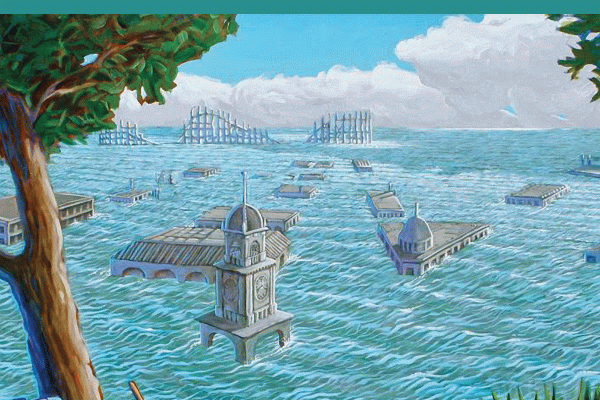WHILE OPENING a star-studded concert for victims of Hurricanes Harvey and Irma, musician Stevie Wonder remarked: “Anyone who believes that there’s no such thing as global warming must be blind.”
These two major hurricanes had just ravaged Texas, Florida, and much of the Caribbean. While scientists are cautious about ascribing causation to any individual storm, they do not hesitate to say that warming waters and altered weather patterns due to climate change will cause many more such destructive events in the future.
As we watched the horrific scenes on our television screens, one thing was clear—the most vulnerable suffer the most.
In Love in a Time of Climate Change, Sharon Delgado asks people of faith to rise up in love and compassion for those most under threat and for all creation. In her introduction, she asks: “What does it mean to reach out in compassion to our suffering neighbors when disaster follows disaster with no end in sight?”
To answer this question, she employs John Wesley—the Anglican priest and theologian who inspired the founding of the Methodist Church—and the “Wesleyan Quadrilateral,” which identifies scripture, tradition, reason, and experience as the key elements of theological reflection. In Delgado’s capable hands, Wesleyan theology, developed primarily in the 18th century, offers timely and surprisingly relevant insights into both honoring creation and establishing climate justice.
In terms of the first element of the quadrilateral, Delgado offers a convincing scriptural case for caring both for the natural world and for neighbor. In particular, she explores Romans 8, in which Paul makes clear that both the human and the nonhuman will be renewed and redeemed by Christ’s love.
On the topic of reason, the author details the significant impacts of climate change, including mass extinction of species, disruption of food and water supplies, enormous dislocation, and, of course, storm events. She pleads with Christians of all stripes to wake up to the scientific consensus on climate change and speaks candidly about the economic and political forces that are at play: “The underlying ideology that propels climate change is Market Fundamentalism, which professes faith in the market above all else.”
As Delgado explores the role of experience, she expresses a sentiment seldom seen in similar books on faith and ecology—the importance of re-engaging and reconnecting with nature itself, and looking for God there: “[C]reation has value for us because we love it and because through it we experience the divine.” Too often, activists forget that a deep and intimate relationship with nature, and God experienced through nature, forms the foundation for changing our behavior toward the earth.
In exploring tradition, Delgado finds inspiration and hope in Wesley’s views on social holiness and mines liberation theology, always emphasizing compassion as a cornerstone of action: “Compassionate action is what love of God and neighbor requires.”
Given the author’s emphasis on compassion and love, it was surprising when, perhaps in her prophetic zeal, she condemns corporate America, the fossil fuel industry, and the Republican party as though they are monolithic. She also repeatedly criticizes and generalizes what she calls “the Religious Right,” saying that “[t]his conservative religious lobby’s talking points and policy proposals on energy and climate are largely indistinguishable from those of the fossil-fuel industry.”
Readers might wrongly conclude that this statement is also true of the many religious conservatives and evangelicals who are actively engaged in addressing climate change. For example, the Evangelical Environmental Network condemned President Trump’s withdrawal from the Paris Climate Accord as “profoundly foolish” and called on “each and every one of us to take a stand for climate action.” If we are to deal successfully with the complexities of climate change, we will need to work lovingly and side by side with our conservative and evangelical brothers and sisters, who have an essential role to play, particularly in the political arena.
Delgado unapologetically says that “this is no time to mince words.” In this interesting work, she makes a compelling call to all people of faith, particularly Christians, to take seriously the “radical changes that are necessary to meet this challenge” of climate change.

Got something to say about what you're reading? We value your feedback!

